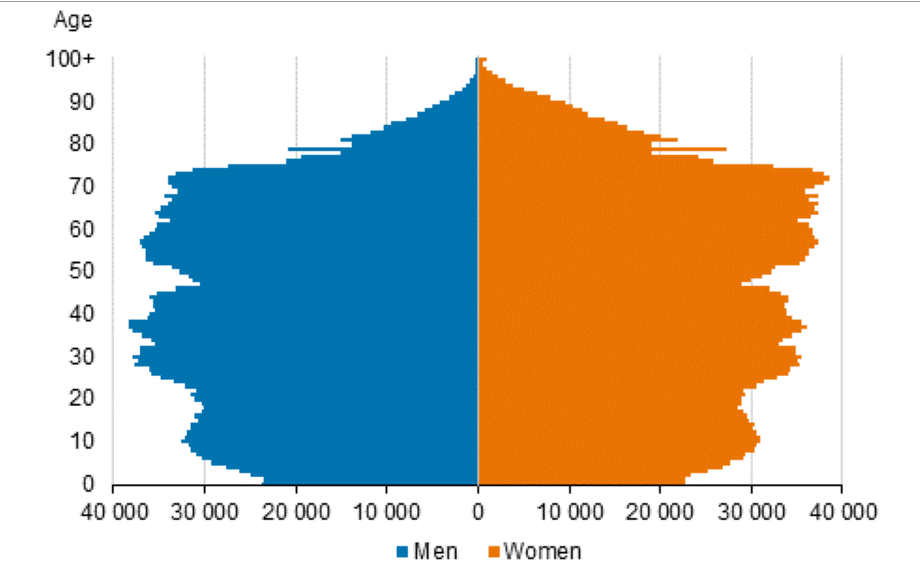Ageing policy
Finland is rapidly ageing
Finland has one of the oldest populations in Europe and we are living in a historical era of four concurrent generations. The population is rapidly ageing as the people in Finland are living longer at the same time as the age of first-time mothers has risen and birth rates have declined.
The baby boomer generation, born between 1946 and 1949, will pose a specific challenge to the service system despite the fact that they are likely to age with better health and functional ability than previous generations.
The share of over-65-year-olds of the population will increase from the current 22 percent to 26 percent by 2030 and to 29 percent by 2060.

Population according to age (1-year) and gender 2020 (Statistics Finland). Population structure data is available from Statistics Finland website also in table format and as excel file. Statistics Finland website
| Service type / 75+ year old population (%) | 2015 | 2016 | 2017 | 2018 | 2019 | 2020 | 2021 | Target |
|---|---|---|---|---|---|---|---|---|
| Living at their own home | 90,6 | 90,9 | 91,1 | 91,3 | 93,0* | 91,9 | 92,6 | 92,0 |
| Regular home care | 11,8 | 11,3 | 11,3 | 17,0** | 16,5 | 15,9 | 15,7 | 13,0 |
| Compensated informal care | 4,7 | 4,7 | 4,8 | 4,8 | 4,8 | 4,6 | 4,6 | 5,5 |
| Service housing with 24-hour care and support | 7,1 | 7,3 | 7,5 | 7,6 | 7,3 | 7,3 | 6,7 | 7,0 |
| Institutional care | 2,1 | 1,7 | 1,5 | 1,3 | 1,0 | 0,7 | 0,5 | < 2,0 |
Proportion of 75-year-old and older population in older people services (Sotkanet.fi, *Statistics Finland, **changed indicator).
As the population ages, the share of working-age people is reduced in relation to the rest of the population. As a result, there is a threat that the number of employees in older people services will be insufficient.
Policy focus on promoting functional ability, independent living and active participation
Finland has begun seeking new ways to respond to the needs for care and support of older people with declined functional ability. Producing older people services more innovatively and effectively will likely slow down the increase in social and health care costs in the coming years.
In Finland, the Ministry of Social Affairs and Health sets out the policy concerning ageing in its strategy, in legislation, quality recommendations, programmes and projects. The aim of the ageing policy is to promote older people's functional ability, independent living and active participation in society.
Read more:
- Quality recommendation to guarantee active and functional ageing and sustainable services in 2024–2027
- National Programme on Ageing 2030: For an age-competent Finland
Early identification and preventive measures of memory disorders
More than 14,500 people in Finland are diagnosed with a dementing disease every year. Such memory disorders do not only affect older people; estimate of the number of people among the working-age population who suffer from progressive memory disorders is 7,000.
Individuals with progressive memory disorders need and rely heavily on social welfare and health care services; for example, three out of four patients receiving 24-hour care have a memory disorder.
Actions are needed
- to promote brain health
- to prevent memory disorders
- to detect memory problems as early as possible
- to develop a system that ensures that treatment, rehabilitation and support are provided systematically and at the right time and that allows monitoring and follow-up.
Development of lifestyle guidance will be introduced throughout the country as part of the future health and social service centre programme. Finnish intervention study to prevent cognitive decline and disability (FINGER) showed that a multidomain lifestyle intervention is beneficial for prevention of cognitive decline. FINGER-model based on the results of this study is now recommended in Finland.
Read more about FINGER-model at FINGER – research project web pages
Prioritising home care is one of the leading objectives of developing older people services. The special task of Finnish municipalities is to support the health and well-being of their residents and enable their living at home.
The Healthy Finland survey will provide up-to-date information on the health, well-being and service use of adults living in Finland, as well as on changes and future developments in these areas.
Healthy Finland Survey
More about life and society, business, arts and culture. Latest news, facts and stats.




